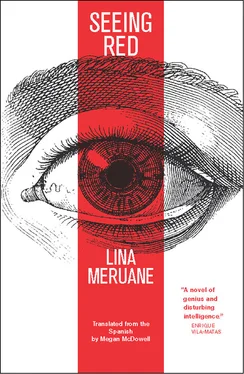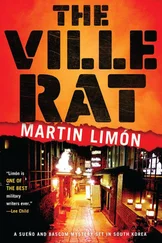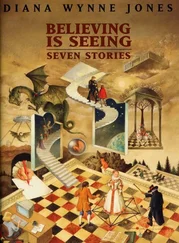Lina Meruane - Seeing Red
Здесь есть возможность читать онлайн «Lina Meruane - Seeing Red» весь текст электронной книги совершенно бесплатно (целиком полную версию без сокращений). В некоторых случаях можно слушать аудио, скачать через торрент в формате fb2 и присутствует краткое содержание. Год выпуска: 2016, Издательство: Deep Vellum Publishing, Жанр: Современная проза, на английском языке. Описание произведения, (предисловие) а так же отзывы посетителей доступны на портале библиотеки ЛибКат.
- Название:Seeing Red
- Автор:
- Издательство:Deep Vellum Publishing
- Жанр:
- Год:2016
- ISBN:нет данных
- Рейтинг книги:3 / 5. Голосов: 1
-
Избранное:Добавить в избранное
- Отзывы:
-
Ваша оценка:
- 60
- 1
- 2
- 3
- 4
- 5
Seeing Red: краткое содержание, описание и аннотация
Предлагаем к чтению аннотацию, описание, краткое содержание или предисловие (зависит от того, что написал сам автор книги «Seeing Red»). Если вы не нашли необходимую информацию о книге — напишите в комментариях, мы постараемся отыскать её.
This powerful, profound autobiographical novel describes a young Chilean writer recently relocated to New York for doctoral work who suffers a stroke, leaving her blind and increasingly dependent on those closest to her. Fiction and autobiography intertwine in an intense, visceral, and caustic novel about the relation between the body, illness, science, and human relationships.
Lina Meruane
Seeing Red — читать онлайн бесплатно полную книгу (весь текст) целиком
Ниже представлен текст книги, разбитый по страницам. Система сохранения места последней прочитанной страницы, позволяет с удобством читать онлайн бесплатно книгу «Seeing Red», без необходимости каждый раз заново искать на чём Вы остановились. Поставьте закладку, и сможете в любой момент перейти на страницу, на которой закончили чтение.
Интервал:
Закладка:
dirt cheap
Ignacio was back in Santiago. Returning to a city he’d never set foot in. Returning like an unfounded rumor, like slander stuck to its victim for life. A taxi drove up very early to number 237. The door opened and first a foot appeared and second a leg and third Ignacio’s skull and then two big suitcases. His left index finger touched the doorbell, and someone must have opened the door for him. He went upstairs and dropped his baggage thunderously. It was his way of announcing himself: making noise, making enough of a racket to wake me up. He was brought low by uncertainty and a silence he didn’t know how to break. When he saw the swell of the pillow, he climbed fully dressed into the bed. It was criminally cold in the house and outside as well, under the dirty Santiago clouds, so thick the lightning couldn’t pierce them; only the rain got through, acid and occasional. It was deadly cold and he was sick. A little sick, just barely. Performing his cough, his fever, exaggerating his stuffy nose, he mumbled an are you asleep? and then curled into me. He blew his nose harshly to finish waking me up. How’d it go? I said, still sleepy and realizing he was over-acting his cold. I missed you, he said, and his voice was that of a plucked bird perched on ice in the south pole. My feet are like rocks. Come here, I whispered to him, my breath thick: put them against me. And I let myself be embraced and I let him put his cold hands between my breasts, let him explode my ears in kisses, I even let him saddle me with his false flu, feeling an infinite pity for Ignacio. You should have stayed there, I told him. You should also have stayed there, he told me. That’s true, I said, and here we are again, both of us. Like two idiots. Yes, what morons, but will you come back with me? Lina? I had to tell him yes, of course, because that’s what I was going to do, but I couldn’t compose an answer that was just right for him, not yet; we still had to finish sleeping and let the days and nights pass and the moon wane languidly. Why give definitive answers so soon? We would get out of bed in spite of Ignacio’s theatrical shivers and the mucous in his handkerchief, and then he would open before me his suitcase studded with locks, like a treasure chest. It was a treasure bought a precio de huevo, as they say in Chile, dirt cheap: the price of an egg, but a rotten egg, an egg cracked in those days from the sudden Argentine bankruptcy. A huevada in the most Chilean sense of the word. A fuck-up by the politicians. A real shit storm, exclaimed Ignacio, indignant, moved, his cold getting a little worse. He’d gotten sick from anxiety and he coughed to clear it away, to clear his throat and convince me that it had undone him to see the city collapsed, but even worse to see its people digging rotten food out of the garbage. And not only the people who’d been miserable for ages and were more inured to disgrace and difficulty, but also the less prepared people, people who dress like you or like me, and he didn’t mean his wrinkled clothes or my slept-in underwear but rather the everyday clothes of the people who can buy them; the whole social-climbing middle class who scrupulously handed their money over to the bank, only to be suddenly left penniless. Left with nothing but a pile of unusable credit cards and the change in their wallets. And with disgust but also with previously unknown greed, the corners of their mouths twisting into an incomprehensible grimace, drooling a saliva that smelled of hunger, they stuck their hands up to the elbows into garbage cans, or they posted themselves at the exits of restaurants to fight over the leftovers. It’s an all-around collapse, added Ignacio between shrill sneezes. People are unemployed or have bad jobs or their salaries are frozen or they’re simply waiting for payment that doesn’t come. But people were still going to work, because it was better to wear yourself out than stay home sitting on your hands; better to wear out your eyes on the computer screen than doze in front of the TV, if they hadn’t cut off your electricity yet for lack of payment; better to do something than stand staring into the empty refrigerator feeling hunger pangs. And then I, continued Ignacio, so scrupulous with money, who never buy anything I don’t need and even less so now that we want to furnish the apartment, I who am terrified of ending up without cash in a foreign country…I, he repeated, talking as if to himself, I, who hold myself back from succumbing to temptation, from being consumed by consumerism (but sometimes you overdo it shopping, I thought, while you were making those declarations of principle). Well, I, I don’t know what you’re going to think of me, but I went out and spent everything I had. I blew the last cent of every dollar on me, I burned every Argentine peso treating complete strangers to beers or glasses of wine, and I paid the bills for people sharing my tables in run-down holes in the wall, in corner sandwich shops, in family-style steakhouses — because the Argentine cows aren’t in crisis — and I wore myself out leaving tips. And it seemed as if he was nearing the end of an astounding epic tale, but then he added, almost without air, his throat contracted, his nose stuffed up, that he had done it all with the stupid idea of stopping the collapse. You alone, with just some dollars? Like a second-rate conquistador with glass beads? Yes, yes, you’re right, I couldn’t think of anything else to do, he said, swallowing. I couldn’t help it, I went into stores like I was possessed and bought something, anything, it was all on sale, and the last thing I bought was this suitcase to carry all the gifts I was bringing you. I heard the sound of a cierrecler, a zipper, which Ignacio called a cremallera but some old Chileans with Arabic ancestry still called marruecos, and the metal teeth opened so Ignacio could take out all the clothes that had been “made in la pamp a.” He hoped I’d like them, even if only by touch. Because this one, see how soft, was a long jacket of sheep leather. One hundred percent Argentine sheep, cut and sewn by desperate hands. Chosen from among hundreds of jackets that the store clerks had modeled for him with the vanity of a different era. They were all short like me. And dark, morocha, he said, or as they say in Buenos Aires, arrabales. And they had very black hair and were plump in spite of or because of their poverty. And while Ignacio was talking about those girls modeling for a small sales commission, he handed me two wool sweaters and a pair of fleece-lined leather gloves and a horse leather belt that pleased my fingertips, and a shirt that felt like cashmere but wasn’t. Merely cash, more like it, he told me. And it’s all black? All black, he said, the blackest black you can imagine.
the use of newspapers
On the ice floe that was Santiago, Ignacio couldn’t stop repeating it’s so cold, my toes are frozen. His feet were like a cadaver’s even with the hot water bottle and three pairs of socks. You don’t use heating here? And yes, sometimes, usually we turned it on in the afternoons. Olga opened the doors and windows early to air the place out, and in filtered a winter that was impossible to chase away with a paraffin stove that, more than heat, exuded an infernal smoke. The currents of air sustained family life, they made us drop our little grudges to join in the accumulation of heat around the table or in a shared bed. But only Ignacio and I were in the house during the day. My brothers only appeared sometimes, fleetingly, on weekends. My parents worked continuously at their respective hospitals, consulting offices, occasional shifts and home visits. Aren’t you dying of cold? Ignacio insisted, rubbing his hands together as if lighting a fire. I was trained to resist the damp air that was seeping into his bones. His teeth chattered. He got up from the chair and bent his legs to wake them up. He rummaged quickly in a packet of cigarettes, the match scratched in my ears, and I heard him suck on the cigarette in spite of his imaginary flu. I could envision him forming fragile smoke rings that his forced cough then tore apart, his dry cough and the beaten voice of a bellyaching Galician. Winter in my Santiago made him remember winter in his own, in Compostela, and he told me again how as a boy he’d slept beside a wall that let water filter in from outside, how he’d spent his whole childhood sick, covered in rashes, his ears hardened by chilblains. He exaggerated his hardships or invented them, all so as not to talk about our own. We need to move, he decided suddenly and predictably, putting an end to his moaning. But aren’t you already moving? You’re pacing like a prisoner. We need to leave the house, he corrected himself. It’s colder inside than out. The car has heat, right? Yes, more or less, I wavered, at least there’s heat from the motor. I want to buy another newspaper, because the one in the house isn’t worth a damn. It used to be great for cleaning windows, I thought, and for wrapping eggs and fish at the market, but I let him transfer his climactic complaints to the newspapers and then I explained. Everyone says the same thing, Ignacio, here there are only opposition newspapers — that is, newspapers of the right. There are no left-leaning papers. Not even centrist papers. No newspaper that is informatively decent. Ignacio sighed. Where can we go? He got up again from his chair and immediately sat down again and crossed his legs. And then he let out an uuf or something similar, and he said no, we can’t go, and he lit another cigarette, scraping another match. And, exhaling meticulously, he said, what a shame we can’t go out. And why not? I don’t know Santiago, he said, I’ve never driven in Santiago. And abruptly stubbing out what was left of his tobacco against the ashtray, he fell silent. What do you mean we can’t? Of course we can, I’ll direct you, I know Santiago like the back of my hand. I told him where to find the keys to the car that had once been mine and was still there, faithfully awaiting my return, and we went down, me limping a little and Ignacio trotting down the stairs that led to the door and the gate, and we went down also along expansive avenues that disappeared into the mountains until they reach, at the bottom, the rotunda that was one of the city’s nerve centers. They killed a minister there, I told Ignacio, pointing ahead without really knowing where to. They dealt with him in the first months of socialism. That was the spark of what would happen later, La Moneda in flames, the open wound of Chile’s history. Yes, says Ignacio, who knows everything about politics but nothing about streets or motors. Ignacio who hates to drive, who now snakes through the city to save himself from claustrophobia. He accelerates so his anxiety can’t keep up, and he heads west, following my directions. I put my memory on autopilot and I give him such precise instructions I surprise myself: keep in the left lane but stay on Costanera. Yes? It’s the large avenue, and go a little further, a few blocks, and when we come to a wide street with three traffic lights with arrows and a left turn lane, keep going straight, and careful with the pedestrian crossing hidden behind some trees. And so we cross Santiago. Turn to go up, toward the mountains. I don’t see any mountains, said Ignacio. They must be there, hidden by thick clouds from industrial smokestacks. And there on the corner must also be a sign. A little wooden sign. Do you see it? (Open your eyes wide, Ignacio, you’re seeing it without seeing it.) Nothing, sighed Ignacio, exhausted as though newly blind himself. I don’t see anything but a closed shop with the window covered in newspapers. Top to bottom, old newspapers singed by the sun. That was where I used to buy books, I told him, in a uselessly tragic tone, and then: go slowly because there’s a speed bump in half a block. You see a big chestnut tree to your left? Then it’s the next street, past a green kiosk. To the left is a parking lot. I hand him change. The cafe terrace will be covered in plastic and will have space heaters. Are we there? Yes, says Ignacio, his words thinning before a sneeze. We sit down to order two cups of coffee and to choose from a pile of worn-out newspapers.
Читать дальшеИнтервал:
Закладка:
Похожие книги на «Seeing Red»
Представляем Вашему вниманию похожие книги на «Seeing Red» списком для выбора. Мы отобрали схожую по названию и смыслу литературу в надежде предоставить читателям больше вариантов отыскать новые, интересные, ещё непрочитанные произведения.
Обсуждение, отзывы о книге «Seeing Red» и просто собственные мнения читателей. Оставьте ваши комментарии, напишите, что Вы думаете о произведении, его смысле или главных героях. Укажите что конкретно понравилось, а что нет, и почему Вы так считаете.












